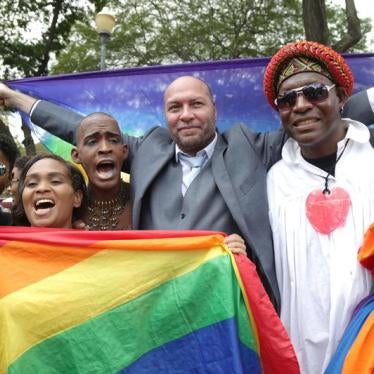LGBT activists from many Commonwealth nations will speak about the problems they face in their daily lives when the leaders of Commonwealth nations meet in London and Windsor the week of April 16. It is important for their voices to be heard.
The Commonwealth’s 53 member states, with a total of 2.4 billion people, are countries with historic ties to the United Kingdom, many of them former colonies, or with ties to other Commonwealth members. The leaders will come together to reaffirm their common values, address the shared global challenges they face, and to seek agreement on how to create a better future for all their citizens.
One of the human rights issues that needs to be discussed is the rights of lesbian, gay, bisexual and transgender (LGBT) people. This is a pressing Commonwealth issue because 36 of the member states still criminalize same-sex acts between consenting adults.
The sodomy laws -- also often called buggery laws or gross indecency laws -- are relics of British colonialism and have in common that they are often broad in latitude, are vaguely worded, and serve to legitimize discrimination and hostility toward LGBT people.
The Commonwealth Summit will host four forums, addressing issues of women, youth, business and people in general. LGBT activists from many of the Commonwealth countries will speak to these forums. Many of the activists are affiliated with TCEN, The Commonwealth Equality Network, an entity that received accreditation for the Commonwealth meeting. In a recent 107-page report Human Rights Watch interviewed LGBT people from seven Commonwealth countries in the Eastern Caribbean. We found that the existence of these laws emboldens people to discriminate against LGBT people.
Richie Maitland, vice-chair of the Eastern Caribbean Alliance for Diversity and Equality (ECADE) and based in Grenada described the effects of the buggery laws in the region: “The fear of harassment, rejection, stigmatization, and even physical violence begins in the home and translates to key social spaces, including church and school.”
Three member-states have decriminalized homosexual conduct in recent years after LGBT activists pressured their governments or went to the courts: Belize, Seychelles and Mozambique. Joseph Muscat, prime-minister of Malta, and 2018 summit chair-in-office of the secretariat of the Commonwealth of nations, is the driving force behind recent progressive new legislation protecting the rights of LGBT people in Malta.
LGBT activists from the Commonwealth countries that criminalize homosexual acts between consenting adults derive hope from these positive examples, but also from the 2012 Commonwealth Charter, which stipulates under chapter II (Human Rights) that all Commonwealth nations are committed to equality and respect for the promotion of civil, political, economic, social and cultural rights… for all without discrimination on any grounds as the foundations of peaceful, just and stable societies. We note that these rights are universal, indivisible, interdependent and interrelated and cannot be implemented selectively.”
The nations agreed in the Charter that they are “implacably opposed to all forms of discrimination, whether rooted in gender, race, colour, creed, political belief or other grounds.”
The Commonwealth meeting will provide the opportunity for the heads of states to listen to the LGBT activists from their countries. These accounts should spur them to action in their own countries and to fulfil their promise as set out in the Charter.







